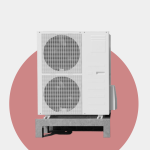
- We have audited 10 models of solid fuel boilers of maximum 500 kW capacity and in 4 instances we have found some irregularities.
- We checked their heating capacity and the level of harmful substance emission which may be dangerous for your health if it is too high, as well as the correctness of the documentation and labelling.
- When purchasing a boiler, you should consider the type of fuel, the size of space to be heated and prospective costs of use, among other things.
The Office of Competition and Consumer Protection together with the Trade Inspection Authority has held audits of 10 solid fuel boilers of maximum 500 kW capacity. The purpose of this campaign was to check if the boilers had satisfied the requirements of the EU eco-project. It assumes reduction of the negative impact onto environment throughout the entire product lifecycle.
In addition to the verification of the relevant documents and labelling, all the devices were covered by the laboratory testing procedure for the selected parameters - experts checked if they had an appropriate level of energy efficiency or if they were efficient as well as the level of exhaust fumes emission affecting the air quality and thus the health of each of us.
- Together with the Trade Inspection Authority, we have been checking if the solid fuel boilers available on the market are safe for use and do not contribute to the excessive emission of harmful substance. The ones which fail to satisfy the requirements should not be marketed at all. This issue is important not only at the beginning of the heating season – says Tomasz Chróstny, the President of UOKiK.
Various dimensions of the audit performed
The formal part of the audit consisted in checking product labelling, including the CE mark, correctness of the declaration of conformity, completeness of technical documentation and user’s manuals. At the same time, the auditors were analsying whether producers had placed the required information such as technical parameters, warnings, rules for proper use or the one related to dismantling and recycling after the end of the boiler use on their websites.
Laboratory experts checked if during the burning process, the boilers emitted dangerous substance such as particulate matter, carbon monoxide, nitrogen oxide, organic gaseous compounds. They also checked if the devices had sufficient seasonal energy efficiency or not. This is the parameter which reflects the actual energy consumption during a heating season - its lower value equals a lower energy class of a device.
- Boiler efficiency affects the costs of its use. Consumers have a right to know the true information about the product, including its energy class. Thanks to this information, they may also take account of the prospective expenditures of its use and take an informed decision about the purchase - emphasises the President of UOKiK.
Conclusions and results of the audit performed
Among 10 audited boiler models, 4 had some irregularities whereof 2 incidents related exclusively to formalities, more specifically to incorrect development of the declaration of conformity and shortages in user’s manuals. Laboratory tests, on the other hand, proved that 2 models failed to satisfy the requirements on seasonal energetic efficiency. Their efficiency was lower than the one declared by producers, which may have resulted in higher costs of use. Administrative proceedings have been pending which may result in a withdrawal of both challenged devices.
The producers of the boilers with formal errors such as documentation deficiencies are obligated to take up corrective measures, that is, to supplement it.
Tips for consumers
When choosing a boiler, you should take account of the following:
- a type of fuel you intend to use (coal, wood, pellet, briquet, etc.)
- a size of the space to be heated - choose a device of relevant power and capacity,
- boiler efficiency - higher efficiency equals to better fuel use and lower costs of use,
- whether the boiler contains the producer’s/importer’s details and the CE mark,
Remember that boiler assembly and maintenance should be performed in line with the producer’s guidelines and by eligible specialists.
Other heating devices - action of the GUNB
Along with the audit performed by the Trade Inspection Authority, actions of the General Office of Building Control [Pol: Główny Urząd Nadzoru Budowlanego - GUNB] commenced which aimed at checking solid fuel heating devices such as freestand stoves. The audits were held both at producers and distributors. Formal audits whose part is still pending, affected 74 device types. Until today, the building control authorities have instigated proceedings against 16 heaters and 33 devices were referred for laboratory testing procedure. The purpose of the tests pending is to check if the heaters have use properties as declared by the producers indeed. The results of those tests will be published at GUNB website.
Information for the media
| +48 603 124 154 | |
| biuroprasowe@uokik.gov.pl | |
 | pl. Powstańców Warszawy 1 00-950 Warszawa |
Follow us
Help for consumers
| 801 440 220 | +48 222 66 76 76 operator fee | |
| poradydlakonsumentow.pl contact form | |
 | Consumer Ombudsmen in your town or district |
 | Trade Inspection in your province |












